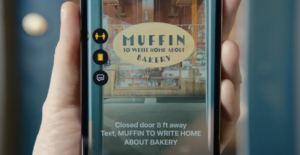From its first trailer, Netflix’s new adaptation of Persuasion had Jane Austen’s fans riled. Many took to Twitter to denounce the Fleabag-ification of humble heroine Anne Elliot. Some lamented that Dakota Johnson was miscast in a role of an overlooked near-spinster. Others sneered at the trailer’s inclusion of modern language, with Anne remarking, “Worse than exes, we’re friends.” And yet I held out hope, because adaptation should embrace reinvention. Because Johnson is an actress who’s exciting and alive. Because it’s easy to see where the likes of Elizabeth Bennet and Emma Woodhouse led to Bridget Jones, Cher Horowitz, and, yes, Fleabag — all headstrong women who were wonderfully funny, flustered, flawed, and ultimately lovable. So, it is with a heavy heart that I confess: this Persuasion fumbles its heroine, humor, and romance.
Adapted by screenwriters Ron Bass and Alice Victoria Winslow, Persuasion is set in the Georgian era, but with a modern sensibility. Thus, Anne Elliot describes herself as “single and thriving.” A friend suggests she ghost a guy, and her attention-seeking sister Mary declares with zero self-awareness, “The thing about me is I am an empath.” Such dialogue collides clumsily with the original Austen poetry, making a muddled path that’s not grounded in past or present. So, a big day out involves long walks in formal wear, while the night leads to Anne doing the 1800s version of drunk dialing her ex: hollering at him out a window.
The Fleabag angling of Persuasion makes some sense.

Credit: Nick Wall/Netflix
With Phoebe Waller-Bridge’s superb limited series, she gave us a fuck-up/anti-heroine, who used snarky humor as a means of distancing herself from feelings of self-loathing and regret. Persuasion uses the direct address device oft associated with Fleabag to give its heroine a means of communicating her most guarded thoughts to the audience. And like Fleabag herself, Anne Elliot feels like a social outcast defined by her one big mistake. In her case, that’s ending her engagement to Frederick Wentworth (a stiff Cosmo Jarvis). However, Austen’s Anne didn’t have the mean streak this movie puts in the mouth of her heroine.
In the novel, Anne is painted as clever, rational, and considerate to a fault. Her concern for the happiness of her family leads her to babysit for a sickly nephew, to coddle her selfish younger sister, and give up the poor sailor she adores because her father doesn’t approve of his lack of standing. While the movie’s Anne still does all these things, her voiceover and Fleabag-like side-eye to the viewing audience shifts the emotional weight of these choices from regret to pointed resentment.
Persuasion‘s Anne Elliot is not the one fans know and love.

Credit: Nick Wall/Netflix
Forget the demure “only Anne” who kept her heartache to herself. Eight years since her broken engagement, Johnson’s Anne is a rom-com trainwreck, complete with hangovers, socially awkward outbursts, and slapstick involving spilled gravy. Also, despite being deemed a “six” at best, there’s no denying this Anne is a stunner because she is played by Dakota Johnson. Perhaps the most comical part of this adaptation is that her social circle resolutely believes Anne to be a plain-looking wallflower.
With a haughty hottie at its center, ‘Persuasion’ becomes overstuffed with stuffy snobs.
This Anne clearly regards all around her as superficial fools, who denied her love and now stand in her way of even the most basic peace. In a direct address to the camera, this Anne openly mocks her sister Mary for our supposed amusement, drolly predicting a list of complaints. She is openly annoyed at her father and elder sister’s earnest social climbing. She sneers at a would-be suitor’s compliments.
The subtlety of Austen’s social criticism is destroyed with this character distortion that makes her heroine catty and self-righteous. With a haughty hottie at its center, Persuasion becomes overstuffed with stuffy snobs. To Johnson’s credit, her charm softens the edge of Anne’s barbs a bit. Still, Anne’s tale in the novel is one of sustained love, endured loss, and ultimately hope. Here, the attempt to add spiciness sours Austen’s most mature romance.
Persuasion‘s love story feels lopsided.

Credit: Nick Wall/Netflix
Johnson’s signature mischievousness makes sense for a smirking version of Anne, but this translation lacks the ardent longing of the novel. Instead, her vulnerability is configured into comedic outbursts and juvenile games intended to aggravate the sisters she feels superior to. By contrast, Wentworth seems a staunch bore, though a well-mannered and handsome one. So, Anne’s attraction to a dashing new love interest (Henry Golding) makes sense. But her early and easy irritation about his romantic theatricality makes the love triangle topple too soon. Her ending seems less happily earned than tediously inevitable.
Curiously, Anne is most compelling when at play with those she loves outside of romance. She’s an enthralling aunt to her rambunctious nephews. To her sisters-in-law, she is a witty companion and trusted friend. In these scenes of play and whispered confidences, Anne’s sweetness is revived, sparkling alongside some of the movie’s most sensational supporting players.
Despite its flaws, Persuasion has some standout performances.

Credit: Nick Wall/Netflix
Director Carrie Cracknell has brought together a crackling supporting cast. Richard E. Grant is splendid as the ludicrously posh and snotty Baronet Elliot; Yolanda Kettle serves as his partner in silly snootery. Nikki Amuka-Bird brings maternal tenderness as Anne’s (arguably nosy) friend, Lady Russell. Izuka Hoyle is beguiling as the jolly Henrietta Musgrove, while Nia Towle dazzles as her emotionally intelligent and lovestruck sister, Louisa. Indeed, these two ladies are so darling that I idly wished for a spinoff to follow their stories more closely. And yet the sly scene-stealer is Mia McKenna-Bruce as Mary Musgrove, née Elliot.
Mary’s dialogue is stuffed with buzzwords plucked from cringe-y Instagram influencers, who make self-care into a self-serving brand. Yet McKenna-Bruce makes such annoying natterings lithely funny with her resolute sulk, wide eyes, and determined delivery. Mary might be mocked for being a wife and mother who relishes neither role, but McKenna-Bruce’s perfectly rendered frustration makes her whinging more amusing than grating, then something more. It’s a shame the movie has so little empathy for a woman who felt marriage was her ultimate goal, and has discovered it’s not the eternal pleasure that she’d been promised. There’s a tragedy in Mary’s story that the film doesn’t seem to acknowledge. Yet McKenna-Bruce’s performance gently does, pressing at the confinement Mary can feel but can’t express aptly for all her talking. (If only some thoughtful soul would actually listen!)
In the end, this Persuasion is a disappointment because it is too much like its ruthlessly remodeled heroine: Undeniably clever but a touch too unkind.
How to watch: Persuasion hits Netflix on July 15.












